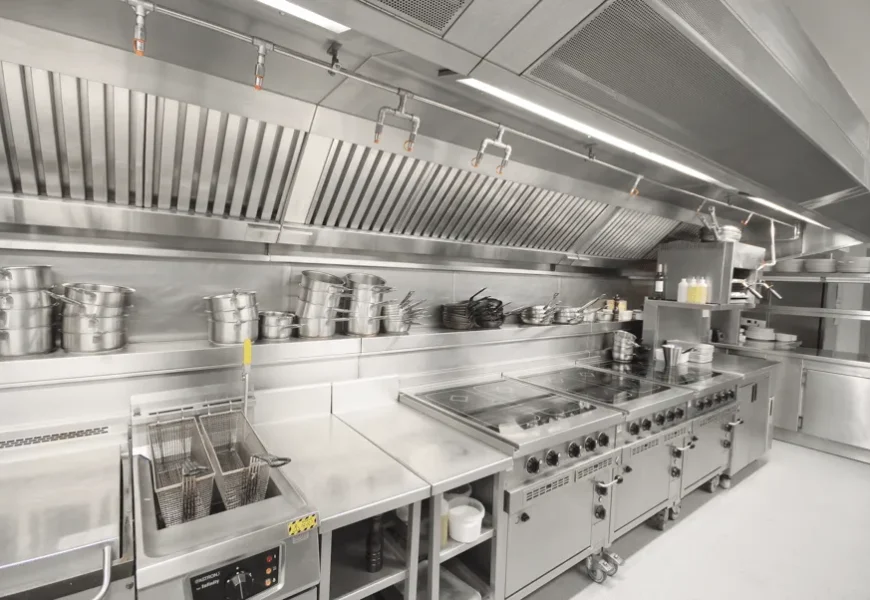When it comes to maintaining a clean and safe kitchen, many restaurant owners and commercial kitchen operators often overlook one crucial aspect: the grease trap cleaning. A well-maintained grease trap not only ensures a cleaner kitchen but also plays a significant role in preventing hazardous situations. Engaging environmental cleaning hood services in Dubai ensures that grease traps are properly cleaned and maintained, helping to improve the overall hygiene and functionality of your establishment while reducing the risk of plumbing issues and foul odors. This blog will explain why grease trap cleaning is vital for a safer kitchen environment and how it can improve the overall hygiene and functionality of your establishment.
What is a Grease Trap?
A grease trap is a plumbing device installed in kitchens, typically beneath sinks or in the drainage system, designed to intercept fats, oils, and grease (FOG) that are discharged from cooking equipment. These substances can solidify and block drains, leading to costly plumbing repairs, foul odors, and even health hazards. Grease traps help separate the grease from wastewater, allowing only clean water to enter the public sewage system.
However, over time, the grease trap collects excess oil and debris, and without proper maintenance, it can become a source of contamination, causing health and safety risks.
Why is Grease Trap Cleaning Important?
1. Prevents Blockages and Drainage Problems
Grease and food particles accumulate inside the trap over time, leading to blockages in the plumbing system. These blockages can disrupt the kitchen’s daily operations and cause expensive and inconvenient plumbing repairs. Regular grease trap cleaning ensures that your kitchen’s drainage system remains clear and functional.
- Accumulation of grease in the trap can solidify and clog pipes, creating a major inconvenience for kitchen staff.
- Routine cleaning eliminates the build-up, preventing slow drainage and potential backups in the system.
2. Reduces the Risk of Fire Hazards
Grease is highly flammable, and if it builds up in the grease trap or the kitchen exhaust system, it poses a significant fire risk. A small spark or heat source can ignite the accumulated grease, leading to devastating fires.
- Regular grease trap cleaning helps reduce the amount of grease that could catch fire.
- A clean kitchen exhaust system ensures there is no grease buildup near heating elements or exhaust ducts.
3. Improves Kitchen Hygiene and Safety
A well-maintained grease trap ensures that your kitchen meets local health and safety standards. Unattended grease traps can breed bacteria, leading to unpleasant odors and contamination risks. Regular cleaning eliminates these issues, promoting a healthier environment for staff and customers.
- Clean grease traps prevent the growth of bacteria and mold.
- Reducing odors from stagnant grease promotes a more pleasant working environment.
4. Helps Prevent Costly Plumbing Repairs
Neglecting grease trap maintenance can result in severe plumbing problems, such as clogged drains and burst pipes. These issues often require costly repairs and downtime, which can be detrimental to your business operations. Regular cleaning prevents such problems, saving you money in the long run.
- Regular grease trap cleaning prevents build-ups that can cause costly plumbing repairs.
- Avoiding downtime is crucial to keeping your kitchen running smoothly.
5. Compliance with Local Regulations
In many regions, including Dubai, health and safety regulations require food establishments to maintain clean grease traps. Failing to comply with these regulations can lead to fines, closures, or legal issues. Regular cleaning ensures that you stay compliant with local laws and avoid unnecessary penalties.
- Grease trap cleaning ensures that you comply with local hygiene and environmental regulations.
- Avoid penalties and maintain a good reputation in the industry by staying compliant.
How Often Should Grease Traps Be Cleaned?
The frequency of grease trap cleaning depends on the size of the trap and the volume of grease and waste generated by the kitchen. Generally, it is recommended to clean grease traps every 1-3 months, though this can vary based on the specific conditions of your kitchen.
Factors that determine cleaning frequency:
- Size of the kitchen:
Larger kitchens with higher volumes of food preparation may require more frequent cleaning. - Type of food served:
Grease traps in kitchens that fry food or use large amounts of oil may need cleaning more often. - Local regulations:
Some jurisdictions have specific requirements for grease trap maintenance.
The Benefits of Professional Grease Trap Cleaning Services
While regular cleaning can be done by kitchen staff, hiring professional grease trap cleaning companies offers several advantages. Professional cleaners are trained to perform the job efficiently and thoroughly, ensuring that your grease trap is properly cleaned without causing any damage to the system.
1. Expert Knowledge and Tools
Professional grease trap cleaning services are equipped with the right tools and knowledge to clean grease traps quickly and effectively.
2. Convenience and Time-Saving
Professional cleaning services allow kitchen staff to focus on their tasks while experts handle the cleaning process.
3. Comprehensive Maintenance
Professional services often provide additional maintenance tips and recommendations to ensure your system stays clean and functional for longer.
4. Environmentally Safe Disposal
Grease trap cleaning companies follow proper disposal procedures, ensuring that waste is disposed of safely and in an environmentally friendly manner.
Conclusion
Regular grease trap cleaning is a crucial part of maintaining a safe, efficient, and hygienic kitchen. Not only does it prevent blockages, reduce fire risks, and ensure compliance with regulations, but it also improves the overall operation of your kitchen. By investing in professional cleaning services, you can keep your kitchen running smoothly and avoid costly repairs. Make grease trap cleaning a priority to ensure a safer, cleaner, and more productive kitchen environment.













